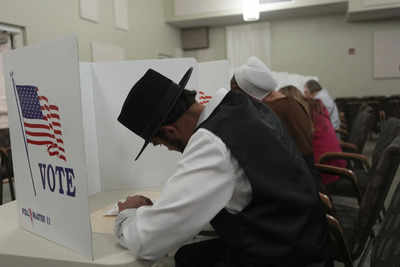
The Unexpected Impact of Amish Voters on Trump’s Campaign in Pennsylvania
In the pivotal election of 2024, Donald Trump broadened his appeal to a wide array of demographics including women, men, younger voters, Black Americans, and Hispanic communities. Yet among these supporters emerged an unexpected group—the Amish community—known for its general disinterest in political activities. This election marked a historic shift as many Amish residents in Pennsylvania registered to cast their votes for Trump like never before.
A Catalyst for Political Engagement: The Raid Incident
This notable engagement was sparked by a controversial government raid on Amos Miller’s raw milk operation located in Bird-in-Hand last January. The action followed reports linking illnesses to dairy products from Miller’s farm and was perceived as an alarming intervention into the daily lives and practices of the Amish people. Already skeptical of federal governance, this incident galvanized community members who felt their traditional lifestyle was under threat.
Mobilizing Support Through Grassroots Efforts
Local activist Scott Presler played a pivotal role in rallying support among the Amish for Trump’s campaign. By spending several weeks within rural Pennsylvania communities—and leveraging the narrative surrounding the raid—Presler effectively raised awareness about perceived government intrusion into farming practices unique to the Amish way of life. His messaging emphasized Trump’s commitment to reducing federal control while advocating for personal liberties and religious rights.
Moreover, Presler didn’t limit his outreach solely to the Amish; he also connected with other conservative groups such as labor unions and hunting associations by underscoring Trump’s stances on job security and Second Amendment protections.
Cultural Shifts: The Significance of “Amish for Trump”
The mobilization labeled “Amish for Trump” highlights how deeply ingrained values can ignite participation even from historically disengaged communities during significant electoral moments. Elon Musk—a high-profile supporter during this campaign—noted at one point that acknowledging issues important to farmers resonated strongly within these circles; “We drew significant attention toward addressing concerns from farmers after episodes like those affecting one particular family,” he said during an interview with Tucker Carlson.
This strategic outreach not only contributed significantly towards securing Pennsylvania—a vital state—in Trump’s broader electoral strategy but also marked an unprecedented political alignment between traditional conservative ideologies and insular societies like that of the Amish.
A Testament To Community Values In Politics
Ultimately, “Amish for Trump” transcended mere statistical anomaly; it reflected a strong commitment among community members aiming to protect cherished traditions against what they viewed as governmental overreach. This surge not only showcased how diverse factions could align under shared beliefs but also pointed towards evolving dynamics within American political landscapes where unexpected coalitions emerge amidst significant societal shifts.
Example words delivered through ballots outside traditional expectations illustrate just how sentiment can drive change—even from corners traditionally seen as passive or disengaged politically—thereby reinforcing that every voice holds power when unified around essential values.
As we reflect upon these developments leading up to November’s elections across various states nationwide—including further observations pertaining trends amongst similar communal voting behaviors—it becomes evident that understanding local intricacies remains crucial when analyzing modern campaigning strategies.
This evolution signifies new alliances shaping America’s vibrant democratic processes today.






